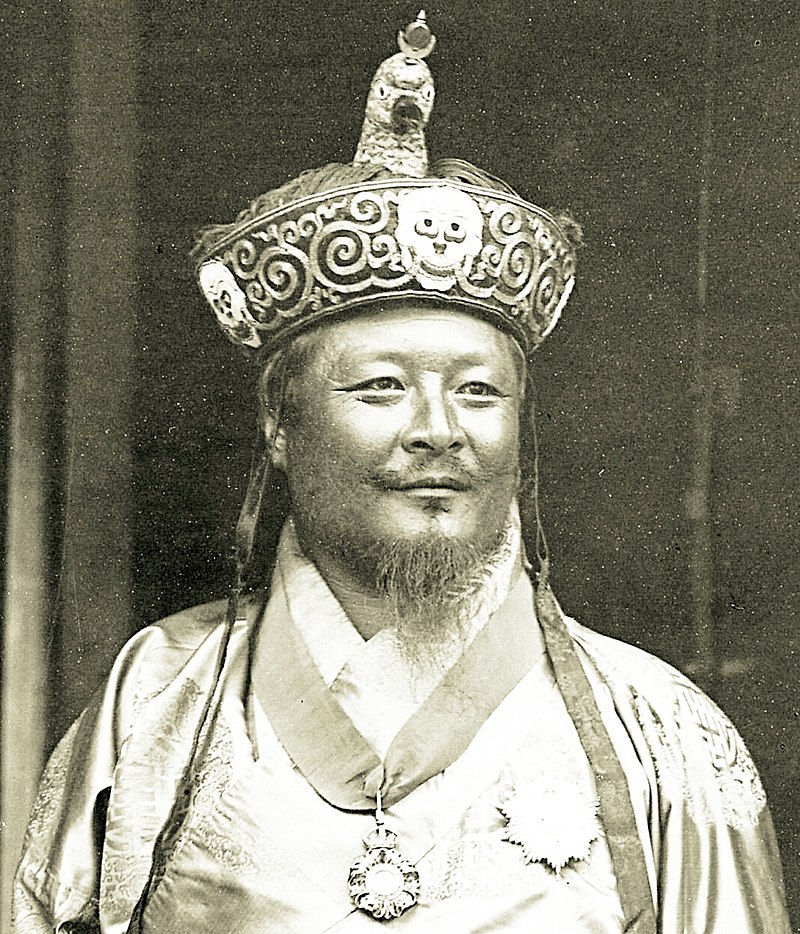THE FIRST DRAGON KING
Bhutan’s first King – Sir Ugyen Wangchuck – was a quintessential warrior statesman. And his enthronement was the much needed paradigm shift Bhutan needed to begin a new era and put an end to the feudal system of governance that prevailed in the Kingdom until then.

In 1878, when he was only 16, he was taken hostage at the Ta Dzong in Trongsa by the disgruntled former Dzongpon Damchoe Rinchen. And, although, he was rescued, he soon had to prove his mettle and daring.
In 1882, he slayed Drontsap Singye Namgyel – a man feared far and wide in the Kingdom for his physical strength and prowess, and who had treacherously assassinated Ugyen Wangchuck’s maternal uncle Trongsa Penlop Pema Tenzin. Before him, many had tried to slay the fearful Singye Namgyel but had failed in their attempts. This accomplishment earned him the reputation of being daring, and, with it, the loyalty of his fellowmen to follow him into battle. That was all he needed to march his troops from Trongsa to Thimphu destroying all foes who attempted to stop him along the way.
In 1885, when Bhutan was at the peak of internal turmoil and civil unrest, he won the decisive battle of Changlimithang thus restoring peace and order in the Kingdom. His name, after the battle, had reached every nook and cranny of the country and beyond, and as a result he was requested by British Political Officer Sir Claude White to accompany him to Tibet in 1904. Subsequently, taking into account his capabilities as a statesman and the following he had established in Bhutan, he was knighted by British India and bestowed the title of Sir. His knighting not only rejuvenated the beleaguered Anglo-Bhutanese friendship but also united the country that was till then plagued by civil war.
In 1907, Sir Ugyen Wangchuck was at his prime when the people, tired of internal strife, looked for a rock solid leader who could ensure sustained peace and stability. So, on December 17, the same year, he was unanimously enthroned as the first Dragon King.
At the time when Bhutan was enthroning its first King, the powerful nations of the world were divided into two power blocs with hostilities escalating beyond control. And in the absence of a close, reliable and powerful ally, there was every possibility that small nations would be gobbled up by the powerful ones. Against this backdrop, in 1910, the visionary King signed the Treaty of Punakha with the British thus cementing Bhutan’s security and sovereignty.

For an isolated nation trying to forge its way into the comity of nations, it was Sir Ugyen Wangchuck who realized that modern education was imperative in order to develop Bhutan. So, in 1914, when the mighty nations of the world lunged themselves into the First World War, Bhutan opened its first modern school in Haa. At the same time, 46 boys from Bhutan were enrolled in Dr. Graham’s Homes – a Scottish mission school in Kalimpong, India – at the command of the King.
The shift from a feudal system to a hereditary monarchy under Ugyen Wangchuck invigorated the small nation to move forward. The choice made by the people in 1907 was indeed the right one. For, after that, the country has always marched in the right direction towards development, fulfillment, happiness, independence, economic stability and self-reliance without once looking back.

